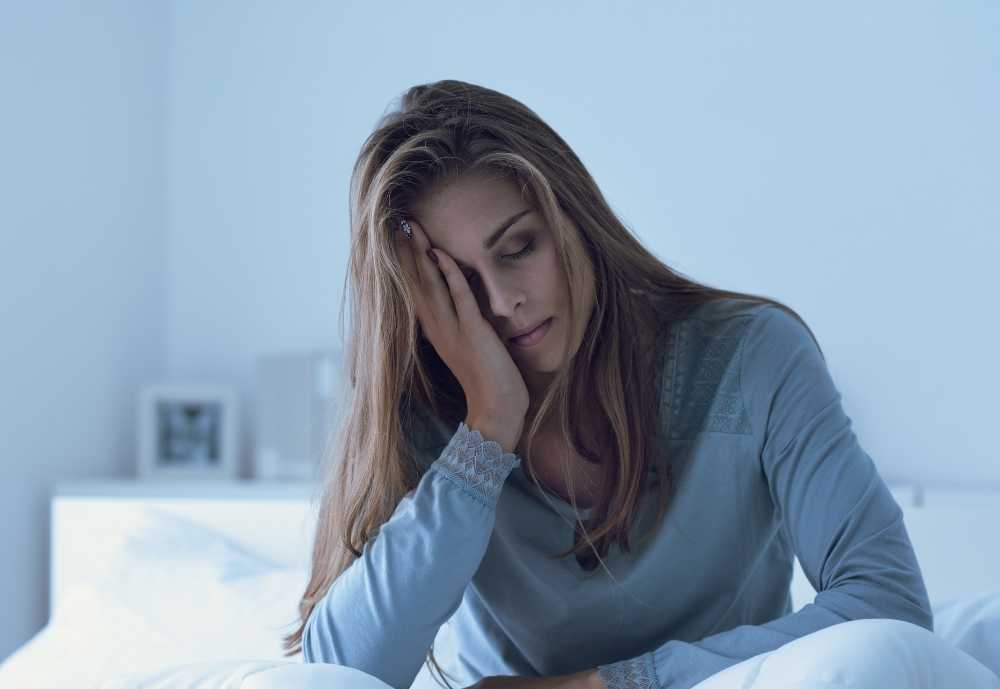As women transition through menopause, a multitude of changes occur within the body, and one of the common challenges faced during this phase is insomnia. Postmenopausal insomnia can disrupt sleep patterns and impact overall well-being. If you’re one of the many women seeking relief from sleepless nights, you’re not alone. In this blog, we’ll explore the postmenopausal insomnia treatment options and lifestyle adjustments to help you reclaim a restful night’s sleep.
Contents
Why Can’t I Sleep After Menopause?
 Several factors contribute to sleep disturbances after menopause. Menopause is a natural biological process marked by the cessation of menstrual periods, typically occurring around the age of 50. While not all women experience sleep disturbances during and after menopause, it is a common concern for many. Here are some reasons why sleep might be affected after menopause:
Several factors contribute to sleep disturbances after menopause. Menopause is a natural biological process marked by the cessation of menstrual periods, typically occurring around the age of 50. While not all women experience sleep disturbances during and after menopause, it is a common concern for many. Here are some reasons why sleep might be affected after menopause:
- Hormonal Changes: Estrogen and progesterone levels decline during menopause, and these hormones play a crucial role in regulating the sleep-wake cycle. The hormonal fluctuations can lead to hot flashes, night sweats, and mood swings, all of which can disrupt sleep.
- Hot Flashes and Night Sweats: These are common symptoms of menopause and can be particularly disruptive to sleep. The sudden and intense heat sensations can wake women up multiple times during the night.
- Sleep Apnea: The risk of sleep apnea increases after menopause. Changes in body composition and hormonal fluctuations can contribute to the development or worsening of sleep apnea, which further disrupts sleep.
- Stress and Anxiety: Menopause can be a time of significant life changes, and the associated physical and emotional symptoms can contribute to stress and anxiety. Elevated stress levels can make it difficult to relax and fall asleep.
- Bone and Joint Pain: Some women may experience joint pain and stiffness after menopause. Discomfort in the joints can make it challenging to find a comfortable sleeping position.
- Medication Side Effects: Women may be prescribed medications for various symptoms associated with menopause. And some of these medications can have side effects that affect sleep.
It’s important to note that individual experiences with menopause vary. Thus, not all women will face sleep difficulties. If sleep disturbances persist and significantly impact your quality of life, it’s advisable to consult with a healthcare professional.
What Are Some Postmenopausal Insomnia Treatment Options?
Postmenopausal insomnia can be challenging, but various treatment options are available to help manage and improve sleep quality. It’s essential to work closely with healthcare professionals to determine the most suitable approach for your individual needs. Here are some postmenopausal insomnia treatment options:
Hormone Replacement Therapy (HRT)
Hormone Replacement Therapy involves supplementing the declining levels of estrogen and progesterone in the body with medications. This approach is particularly effective in addressing postmenopausal symptoms like hot flashes and night sweats, which can significantly disrupt sleep patterns. By restoring hormonal balance, HRT aims to alleviate these symptoms, thereby promoting better sleep. It’s important to note that while HRT can be beneficial for some women, it may not be suitable for everyone.
Non-Hormonal Medications
In cases where hormone replacement therapy may not be the preferred option or if there are contraindications, non-hormonal medications may be considered. Certain antidepressants, such as selective serotonin reuptake inhibitors (SSRIs) or selective norepinephrine reuptake inhibitors (SNRIs), are sometimes prescribed to manage symptoms like hot flashes and improve overall sleep quality. These medications work by affecting neurotransmitters in the brain and can have a positive impact on mood and sleep.
Cognitive Behavioral Therapy for Insomnia (CBT-I)
Cognitive Behavioral Therapy for Insomnia is a structured therapeutic approach that addresses the thoughts, behaviors, and environmental factors contributing to sleep disturbances. CBT-I aims to modify negative thought patterns and establish healthy sleep habits. This evidence-based therapy is often considered a first-line treatment for insomnia due to its effectiveness and the fact that it addresses the root causes of sleep difficulties. It typically involves a series of sessions with a trained therapist and can be a valuable tool in managing postmenopausal insomnia.
Sleep Medications
In some instances, healthcare providers may consider short-term use of sleep medications to help women cope with the immediate challenges of insomnia. Medications such as benzodiazepines or non-benzodiazepine hypnotics can promote relaxation and aid in falling asleep. However, these medications are generally recommended for short-term use due to potential side effects, including the risk of dependency. Individuals need to have open communication with their healthcare providers regarding the potential risks and benefits of sleep medications, ensuring that these interventions are used judiciously and under close supervision.
Regular Exercise
 Engaging in regular physical activity has proven benefits for overall health, and it can be particularly advantageous in managing postmenopausal insomnia. Exercise helps regulate hormones, reduces stress, and promotes a sense of well-being. However, it’s crucial to find the right balance, as rigorous exercise close to bedtime may have the opposite effect. Aim for at least 150 minutes of moderate-intensity exercise per week, such as brisk walking, swimming, or cycling. Incorporating physical activity into your routine not only supports better sleep but also contributes to overall cardiovascular health and weight management.
Engaging in regular physical activity has proven benefits for overall health, and it can be particularly advantageous in managing postmenopausal insomnia. Exercise helps regulate hormones, reduces stress, and promotes a sense of well-being. However, it’s crucial to find the right balance, as rigorous exercise close to bedtime may have the opposite effect. Aim for at least 150 minutes of moderate-intensity exercise per week, such as brisk walking, swimming, or cycling. Incorporating physical activity into your routine not only supports better sleep but also contributes to overall cardiovascular health and weight management.
Mind-Body Techniques
Practices like meditation and mindfulness have shown promise in improving sleep quality by calming the mind and reducing stress. Incorporating relaxation exercises into your routine, such as deep breathing or progressive muscle relaxation, can signal to your body that it’s time to unwind. Mind-body techniques are valuable tools for managing the emotional aspects of postmenopausal insomnia, helping to ease anxiety and promote a more tranquil mental state before bedtime. Consistent practice of these techniques can enhance overall sleep hygiene and contribute to a more restful night.
Dietary Changes
Paying attention to your diet can have a significant impact on sleep. Avoid heavy meals close to bedtime, and be mindful of stimulants like caffeine and nicotine. Some women find that foods containing tryptophan, such as turkey or dairy products, may promote better sleep. Additionally, incorporating magnesium-rich foods, like nuts, seeds, and leafy green vegetables, into your diet can support relaxation and improve sleep quality. Maintaining a balanced and nutritious diet not only benefits your overall health but also contributes to better sleep hygiene during the postmenopausal stage.
Herbal Remedies and Supplements
Some women explore the use of herbal remedies and supplements to address postmenopausal insomnia. While not universally recommended, certain options like valerian root or chamomile tea have been traditionally associated with calming effects. Melatonin supplements may also be considered, as melatonin plays a key role in regulating the sleep-wake cycle. However, it’s crucial to consult with a healthcare professional before incorporating these remedies, as their efficacy and safety can vary, and they may interact with other medications or health conditions.
Consultation with Healthcare Professionals
Persistent postmenopausal insomnia warrants consultation with healthcare professionals, including gynecologists or sleep specialists. These professionals can conduct a comprehensive evaluation, taking into account your overall health, lifestyle, and specific symptoms. Based on this assessment, they can tailor a treatment plan that may include a combination of the aforementioned strategies. Regular follow-ups ensure that the chosen interventions are effective and can be adjusted as needed. Seeking professional guidance is crucial in identifying and addressing the root causes of postmenopausal insomnia, leading to a more targeted and successful approach to improving sleep quality.
Remember that individual responses to treatments may vary, and it may take some time to find the most effective approach for you. Open communication with your healthcare team and a commitment to adopting healthy sleep habits are key components of successfully managing postmenopausal insomnia.
What Are Some Self-Care Tips For Postmenopausal Insomnia?
 Self-care plays a crucial role in postmenopausal insomnia treatment. Implementing healthy habits and making lifestyle adjustments can significantly improve sleep quality. Here are some self-care tips specifically tailored for postmenopausal insomnia:
Self-care plays a crucial role in postmenopausal insomnia treatment. Implementing healthy habits and making lifestyle adjustments can significantly improve sleep quality. Here are some self-care tips specifically tailored for postmenopausal insomnia:
- Establish a Consistent Sleep Schedule
Maintaining a regular sleep schedule is vital for regulating your body’s internal clock. Go to bed and wake up at the same time every day, even on weekends. Consistency helps reinforce your natural sleep-wake cycle.
- Create a Relaxing Bedtime Routine
Develop a calming pre-sleep routine to signal to your body that it’s time to wind down. This could include activities such as reading a book, taking a warm bath, or practicing relaxation exercises.
- Optimize Your Sleep Environment
Ensure your bedroom is conducive to sleep. Keep the room cool, dark, and quiet. Invest in comfortable bedding and consider using blackout curtains to block out external light. Remove electronic devices that emit blue light, as it can interfere with melatonin production.
- Limit Stimulants Before Bed
Avoid consuming stimulants like caffeine and nicotine in the hours leading up to bedtime. These substances can disrupt sleep patterns and make it harder to fall asleep. Opt for a soothing herbal tea or warm milk instead.
- Limit Fluid Intake Before Bed
Reduce the likelihood of nighttime awakenings by moderating your fluid intake in the evening. While staying hydrated is essential, try to limit consumption close to bedtime to minimize trips to the bathroom during the night.
- Seek Social Support
Share your experiences with friends, family, or support groups. Connecting with others who understand your journey can provide emotional support and a sense of community. Talking about your challenges can also help alleviate stress and anxiety, contributing to better sleep.
Remember, self-care is a holistic approach that involves taking care of your physical, mental, and emotional well-being. Consistently practicing these self-care tips can contribute to improved sleep quality and overall postmenopausal health.
How Long Does Menopause Insomnia Last?
 The duration of menopause-related insomnia can vary widely among individuals. For some women, insomnia may be a temporary and relatively short-lived symptom, lasting for a few months to a couple of years during the initial stages of menopause. In these cases, sleep patterns often stabilize as the body adjusts to hormonal changes. However, for others, postmenopausal insomnia may persist for a more extended period, extending beyond the immediate menopausal transition.
The duration of menopause-related insomnia can vary widely among individuals. For some women, insomnia may be a temporary and relatively short-lived symptom, lasting for a few months to a couple of years during the initial stages of menopause. In these cases, sleep patterns often stabilize as the body adjusts to hormonal changes. However, for others, postmenopausal insomnia may persist for a more extended period, extending beyond the immediate menopausal transition.
Moreover, while some women may find relief through lifestyle adjustments or medical interventions, others may continue to manage and adapt to changes in sleep patterns over the long term. Regular communication with healthcare professionals can help individuals navigate and address the specific challenges they face during this phase.
Conclusion
In conclusion, postmenopausal insomnia treatment involves a combination of self-care strategies, lifestyle adjustments, and, if necessary, medical interventions. From establishing a consistent sleep routine and optimizing your sleep environment to exploring treatments like hormone replacement therapy or cognitive-behavioral therapy, there are various approaches to improve sleep quality during and after menopause. Recognizing the uniqueness of each woman’s experience, it’s important to experiment with different strategies.
Remember, achieving better sleep is a gradual process, and with patience, persistence, and a tailored approach, many women can find relief and enjoy restful nights during this life stage. If you are facing menopause-related issues, menopause treatment at HerMantra can help. Book your free trial online menopause treatment session now.


